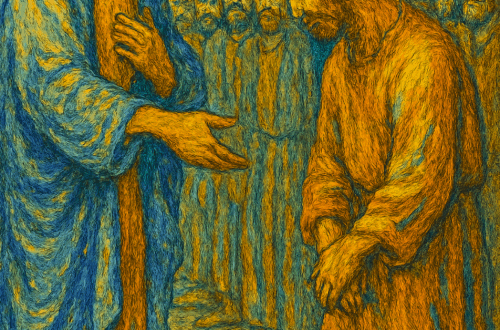
I want to be at Holy Places 1
This text is a transcription of the podcast “Kiki and Ingrid” – a young chinese woman meets Ingrid, the singer.

One day I heard His calling.
Sinners repent.
I have heard and received Jesus Christ,
and now I am a child of God.
From the kingdom of evil and darkness
He has brought me into the kingdom of God.
I am happy about my salvation,
that I can call God my Father.
I want to be in holy places,
singing the glory of God,
singing of all His wonders,
giving thanks for what He has done on the cross.
I never deserved so much grace,
which He has given to me on the cross.
I am a new creation,
through the water and the Spirit in God.
God remembered me,
that I am lost without Him.
I lived in the dust of the world,
and now I am living in the light.
And now I am walking with Him.
He transforms me every day.
The flesh is dying, but the spirit is living.
Sometimes it costs to die,
but soon I will see Christ.
When He returns on His day,
I want to be in the union of the saints,
praising the King eternally.
Could you please explain “Which he has given to me on the cross?” — this sentence in the song?
Also tell listeners what Jesus did on the cross.
When we read the Bible we find the story of creation in the book of Genesis (chapters 1 and 2).
The last of the created beings was the human being. God created humans to have fellowship with him and put them in the Garden of Eden.
In contrast to animals, which react by instinct, God gave human beings a will of their own.
They can decide to be with God and obey, or to disobey. The only commandment in the Garden of Eden was not to eat from the tree of the knowledge of good and evil — to live by their own will and without God. God warned that the consequence would be death: first spiritual, then physical.
Genesis 2:16–17
16 And the LORD God commanded the man, saying, Of every tree of the garden thou mayest freely eat:
17 But of the tree of the knowledge of good and evil, thou shalt not eat of it: for in the day that thou eatest thereof thou shalt surely die.
In Genesis 3 human beings were deceived by the enemy of God, who appeared in the form of a serpent, and they ate the forbidden fruit.
Genesis 3:4–6
4 And the serpent said unto the woman, Ye shall not surely die:
5 For God doth know that in the day ye eat thereof, then your eyes shall be opened, and ye shall be as gods, knowing good and evil.
6 And when the woman saw that the tree was good for food, and that it was pleasant to the eyes, and a tree to be desired to make one wise, she took of the fruit thereof, and did eat, and gave also unto her husband with her; and he did eat.
God hates sin, but he loves the sinner. Therefore he promised a Redeemer, who would be his own Son. In Genesis we read that “he will bruise the head of the serpent, and the serpent shall bruise his heel.”
Genesis 3:15
15 And I will put enmity between thee and the woman, and between thy seed and her seed; it shall bruise thy head, and thou shalt bruise his heel.
In Romans 6:23 we read:
For the wages of sin is death; but the gift of God is eternal life through Jesus Christ our Lord.
We are guilty and deserving of death because of our sins. But Jesus took our place on the cross and paid the price for us.
Isaiah 53 describes this sacrificial suffering:
Isaiah 53:1–9 (selected verses)
1 Who hath believed our report? and to whom is the arm of the LORD revealed?
2 For he shall grow up before him as a tender plant… he hath no form nor comeliness; and when we shall see him, there is no beauty that we should desire him.
3 He is despised and rejected of men; a man of sorrows, and acquainted with grief…
4 Surely he hath borne our griefs, and carried our sorrows…
5 But he was wounded for our transgressions, he was bruised for our iniquities: the chastisement of our peace was upon him; and with his stripes we are healed.
6 All we like sheep have gone astray; we have turned every one to his own way; and the LORD hath laid on him the iniquity of us all.
7 He was oppressed, and he was afflicted, yet he opened not his mouth: he is brought as a lamb to the slaughter…
8 He was cut off out of the land of the living… for the transgression of my people was he stricken.
9 And he made his grave with the wicked, and with the rich in his death; because he had done no violence, neither was any deceit in his mouth.
The Chinese character for “love” (爱) is interesting: some see a pictorial composition that suggests layers of giving and relationship. But the greatest demonstration of love is shown by Jesus: “Greater love hath no man than this, that a man lay down his life for his friends.” (John 15:13).
“And now I am a child of God” — when someone becomes a child of God, what is the feeling in the heart at that holy moment? Please share the joyful feelings with our listeners.
God owns all in the universe. Even though humans may hold many things, in the end everything belongs to God — nobody can take anything with them when they die. When I am a child of my Father in heaven, I live spiritually in his house. When I have a need, I can pray, and he considers whether it is good for me; if it is, he gives it.
Like good parents, he sends us to the school of life, but under his supervision. He is not like the demons and powers of darkness who want to destroy us. He gives us tests and difficulties which help us grow and come to a deeper understanding of his love and grace.
But the most important thing is relationship. When I pray to my Father in heaven or glorify him with a worship song, my heart is full of joy, even when there may be no earthly reason for it. God is a person; he feels joy and happiness when I come and sing to him.
Please talk about the difference between “believe in myself” and “believe in God.” What is the difference?
When I believe in myself, sooner or later I will meet my limits. People say it is normal to pass a midlife crisis; many fall into depression or mood changes in middle age. What happens when I get sick? We are fragile; a simple accident can change our life and confine us to bed.
What about our faults — call them sins? If we are honest, the balance of good and bad deeds usually shows more failings than successes. If there were a points system, we would not score well.
Then Jesus comes and says: “Come unto me…” (Matthew 11:28–30):
28 Come unto me, all ye that labour and are heavy laden, and I will give you rest.
29 Take my yoke upon you, and learn of me… and ye shall find rest unto your souls.
30 For my yoke is easy, and my burden is light.
That is exactly what we need when we work a lot and struggle with many problems — a resting place at the feet of Jesus who invites us to come.
Love is contribution. You may serve much in life and others may not appreciate it. At that moment, what will Jesus tell you — to give up or to continue to contribute? The Bible tells us that no one is perfectly righteous, so we cannot expect imperfect people to reward us.
In Matthew 13 we read the parable of the sower. The sower does not control the outcome of every seed: some fall on the path, some on rocky ground, some among thorns, and only some bear fruit. We should not stop doing what the Lord asks us to do just because results are uncertain. Keep working — the Lord knows the outcome. The ultimate reward for faithful work comes in heaven, when Jesus will give us a crown for what we have done for him on earth.
“Sometimes it costs to die / Soon I will see Christ” — people fear death. Will you feel scared and worried?
First, if we have received Jesus Christ as our Redeemer, we are a new creation in him (cf. 2 Corinthians 5:17). The problem is that we still live in our earthly body — the flesh — which inclines to sin if we allow it. We must feed the new creation in us, not the flesh: by reading the Bible, praying daily, and seeking fellowship with other Christians.
It is not always easy to obey the Lord; that is why the song says “sometimes it costs to die.” When I think of death on earth, I am not scared. I believe I will not feel much when I die — it is similar to being born: dramatic for the baby, but the person who arrives does not remember the process. I will change my environment, but I will not feel much of the transition; when I arrive in heaven, I will not remember that I died.
One reason people fear death is fear of punishment in another realm. But first, I know that Jesus paid the bill for me here on earth, and I will go to heaven. Second, the Bible describes heaven as a wonderful place: no illness, no pain, no crying — only wellbeing. We will walk on streets of gold and suffer no extremes of heat or cold. So as the years on earth pass, I know my Redeemer lives and has prepared a good and holy home for me when life here ends.




